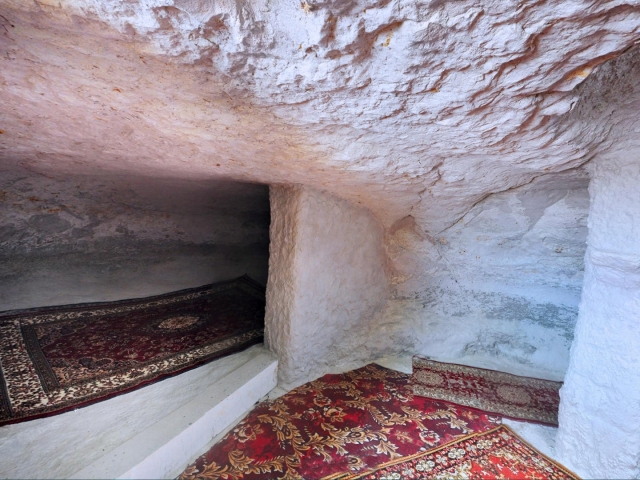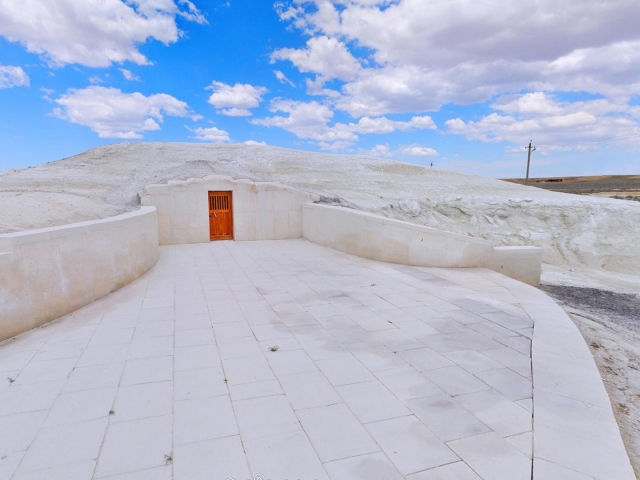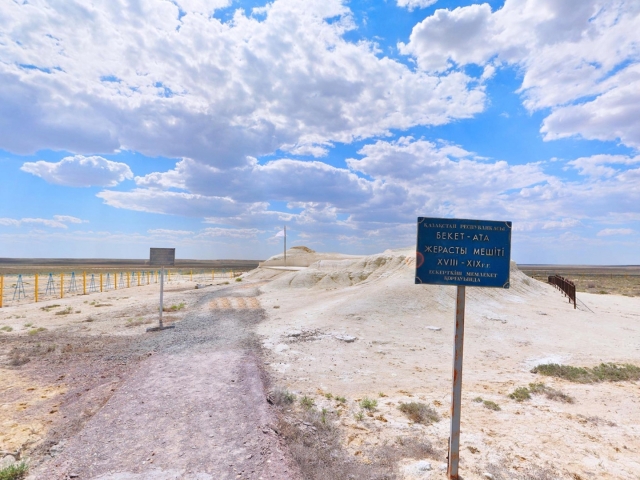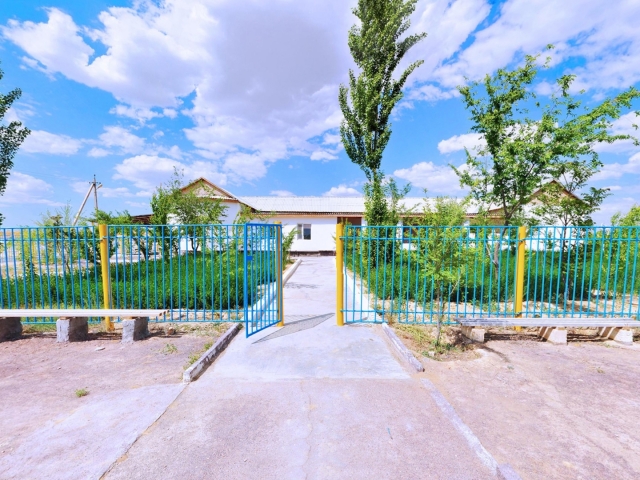Places
List of objects included in the map
Becket-Ata Underground Mosque in Tobykty
Location: Mangistau district in Mangistau region, 30 km to the south from Kyzan village.
Coordinates: N 44°39' 12.83" , E 52°27' 15.96"
Description of the Monument: Studied by expedition of Mangistau National Historical and Cultural Reserve in 2004 under the direction of K. Kanissova. Included in governmental records upon Resolution no. 197 dated October 5, 2004 of Mangistau Regional Akimat. It is currently included in the list of national historical and cultural monuments of local value by Order no. 279 dated July 28, 2010 by Mangystau Regional Akimat . Restoration works of the mosque took place in 2006 ('Paryz' LLP). In 2015 'Mangistaurestavratsiya' also conducted restoration works. The mosque is located in the outcrops of the Cretaceous rocks, rising to the height of 10 m. There are two small interconnected rooms. The original appearance of the mosque is well preserved. Its rooms are adjacent to each other, the roof is lightened, and there is a hole to let the air in. It is protected by the government as a historical monument associated with the life of Becket Myrzagulyuly, who was a religious and historical figure, philosopher, educator, granted with the title of pir. The area of the room is about 10 sqm. The second room is oval with size of 5x3 m. Currently the mosque is in good condition. The diameter of the light hole is 1.5 m. Three wooden poles are installed through this hole. According to researches of our scientists, this mosque is one the mosques where educator Becket Myrzagulyuly taught Sufism to children.
Historical Data, Legends and Stories: Becket Myrzagululy (18th c.) was a philosopher and educator, descendant of the Adai clan, inhabiting Ustyurt and Mangistau, and Atyrau. In his youth he became famous as a skillful commander and a brave warrior in the battle for freedom of his people from the neighboring warlike Turkmens and Kalmyks, and people called him for this Yer Becket. Willing to establish peace and consent at home, Becket gets on the path of religion. It was the only way that could stop endless bloody and exhausting strife with neighbors, impeding cultural development of the people, but also leading to their extermination. Having been trained in Khiva by the famous Sufi Bakyrgan-Kazhy, Becket returned his homeland and continued his works among his fellow tribesmen. He built underground mosques, organized education of children, preached service of God through his personal example. During his life he constructed a number of mosques in places of seasonal migration of his tribe. Murzabolatuly was ova Sade was a peer of Becket Ata. Having heard that Becket Ata was going to build a mosque on Oglandy mountain he joined the construction. Baisal also assisted the good cause sparing no efforts. After long work all the builders returned home, only Baisal stayed and worked continuously and tirelessly. There was no one who would not have been surprised with his special power and energy. Of course, his special enthusiasm and intent did not slipped attention of Becket Ata. One day Beckett told Baisal: 'Baisal you did a lot. There is no end of your willpower. May God reward you for your work!'. And then immediately he added, as if reading Baisal's sad thoughts about a heir: 'Tell your wife not to worry. You have a successor next year. One but worth a thousand. If a son is born name him Mynkissi'. Happy Baisal returned from the village of Becket Ata, and cheered up his wife Karashash. Next year the prediction of Becket Ata came true. At the age of 48 Karashash became a mother of a boy. Celebration took place and the boy was given the name Mynkissi. When his cherished dream came true Baisal sent a messenger to Becket Ata with an invitation to shildehana-toy. Becket Ata responded to the invitation: 'Blessed be the newborn! In Allah's time I will come to visit him in 40 days. Tell him I will not be able to come this time.' Having heard the words of the messenger when he returned from Becket Ata Baisal thought: 'All his life this man read namaz only in the mosque. Before his arrival I have to prepare the mosque specially for Becket'. And having come to this conclusion he began to look for a convenient place on the Buzachi Peninsula, and started sand excavation in an elevated area in Tobykty lowlands. Probably all his relatives and people of the village joined such a good cause. This mosque was finished 3 days before the arrival of Becket-Ata to the village of Baisal. In the promised time Becket Ata came to the village of Baisal. In the mosque prepared by Baisal he read the late afternoon, evening, night and morning prayers.
Sources:
- 'Adai Shezhiresi', pp.
336-337;
- Archives
of Mangistau National Historical and Cultural Reserve;
- Study by
expedition of Kazproektrestavratsiya Institute of the Ministry of Culture of
Kazakh SSR 1986.
Views: 6660
Video
Маршрут
Hazret Yerzhan Burial
Shopan Ata Necropolis and Underground Mosque
Shakpak Ata Necropolis and Underground Mosque (14th–19th centuries)
Khatam-Ishan Mausoleum
The earliest structures here date back to the second half of the 17th c. The necropolis was developed in time and space in a circle, i.e. the most ancient constructions remained in the center. Out of the two extant domed mausoleums, the structure in the southern part of the necropolis is of particular interest. ...















